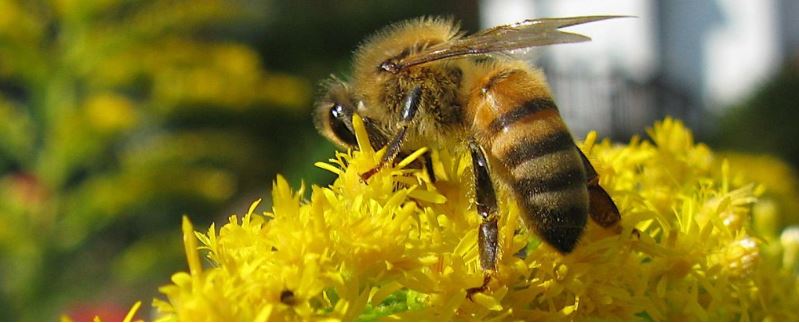


 2:31:53
2:31:53  2024-06-14
2024-06-14  1427
1427

Even without a central nervous system, some life on planet Earth can behave in arguably intelligent ways. Plants are not often thought of as cognizant beings, but perhaps that's our own brain-y bias at play.
In a fascinating and contentious new paper, Andre Kessler, a chemical ecologist at Cornell University, and his doctoral student, Michael Mueller, argue that the behavior of some plants can fit into a certain definition of intelligence.
The two scientists explain that when confronted with a problem, some flora species can act and respond to their environment using a kind of memory coupled with what are argued to be decision-making abilities.
A recent discovery from Kessler's lab is their perfect example.
A weed-like flower, known as the tall goldenrod (Solidago altissima), can apparently 'hear the screams' of its neighbors when they are under attack by a hungry herbivore.
When leaf beetle larvae begin to munch on the leaves of goldenrods, the plants emit volatile organic compounds (VOCs) which signals to the insects that the plant is damaged and that they should move on to a better source of food. At the same time, the attacked plants also alter the reflection of red light from their leaves, which is detectable at a distance by other plants.
Both the light and the wafting chemicals appear to serve as private, distant warnings of impending danger to other goldenrods in the vicinity. Only neighboring relatives with the the 'understanding' can crack the code embedded in the VOCs.
In response, these neighboring goldenrods shore-up their fortifications against predators, growing faster and producing defensive compounds to fight off insects – similar to an animal immune system.
In this silent and secretive way, goldenrods are not only integrating information from the environment, Kessler and Mueller argue, they are anticipating and preparing for future conditions based on their current environment.
Similar behavior is also seen in the tobacco plant, and according to Kessler and Mueller, it falls under the "umbrella of a general concept" of intelligence: meeting goals, like survival, in a wide range of environments.
Goldenrods may not have nerves communicating via electrical signaling, but their cells are linked up into systems operating via chemical signalling, allowing the network to move and react as one, even without a central nervous system.
"They can smell out their environment very precisely; every single cell can do it, as far as we know," says Kessler.
The response of a plant to VOCs is more than just a reflex, or fixed action pattern, Kessler and Mueller argue. It is a 'considered' behavioral change, based on the costs of herbivory and peer competition.
According to a 2022 study by Kessler and his colleague, Alexander Chautá, when no other flowers are around, goldenrods under attack don't emit the same light from their leaves.
"Depending on the information it receives from the environment, the plant changes its standard behavior," explains Kessler.
"Given this definition and the amassed evidence, the question is not whether plants express intelligent behavior but how they achieve it without a nervous system and what the ecological consequences of these behaviors entail," argue Kessler and Mueller.
Assigning terms like 'intelligence' to plant life is highly controversial, but after decades of scientific dismissal and disdain, this field of research is finally beginning to bloom.
Goldenrods are hardly the only plants known to use VOCs to privately 'talk' to their neighbors about shared threats. Scientists have known some plants exchange information this way since the 1980s. Yet much of this research has only been done in the lab, and there is still plenty to be learned about how plants respond to these private communication networks.
Some scientists remain skeptical about such results and whether they can be explained using subjective language such as intelligence.
Yet regardless of whether researchers agree on what definitions to use, or which plants meet such thresholds, it is clear that more work is needed to test the potential perception, learning, decision-making, and memory processes among our planet's flora.
Reality Of Islam |
|

Labor short

A new ultra

Batteries p
 9:3:43
9:3:43
 2018-11-05
2018-11-05
10 benefits of Marriage in Islam
 7:5:22
7:5:22
 2019-04-08
2019-04-08
benefits of reciting surat yunus, hud &
 9:45:7
9:45:7
 2018-12-24
2018-12-24
advantages & disadvantages of divorce
 11:35:12
11:35:12
 2018-06-10
2018-06-10
 6:0:51
6:0:51
 2018-10-16
2018-10-16
 2:13:43
2:13:43
 2022-05-27
2022-05-27
 6:0:8
6:0:8
 2023-03-19
2023-03-19
 7:45:39
7:45:39
 2018-06-21
2018-06-21
the happy life of mankind requirement
 6:36:36
6:36:36
 2022-01-25
2022-01-25
 2:11:12
2:11:12
 2022-10-15
2022-10-15
 10:35:40
10:35:40
 2022-05-26
2022-05-26
 1:38:41
1:38:41
 2021-12-08
2021-12-08
 5:41:46
5:41:46
 2023-03-18
2023-03-18
| LATEST |